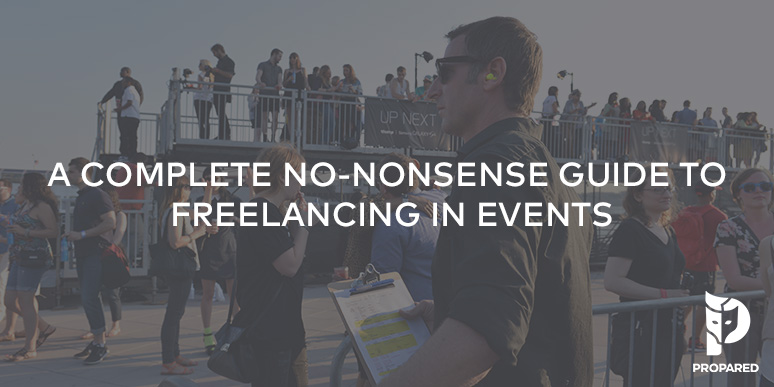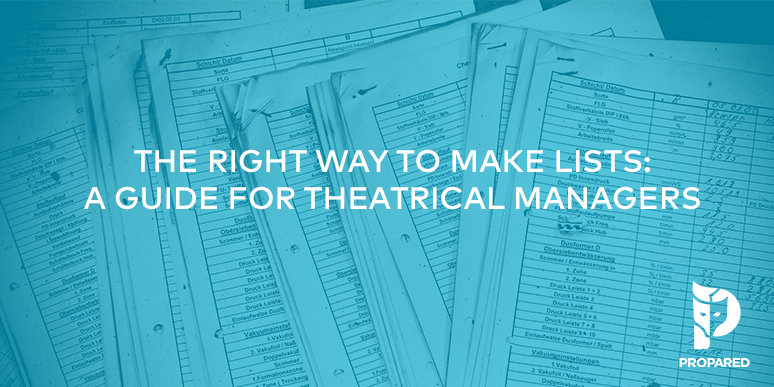
The term “freelancer” gets thrown around a lot these days. We do it, too. It’s an easy way to loosely define most of the people working in events. But “freelancer” isn’t a job title. It’s merely the method by which you conduct your particular business. There are freelance event planners, production managers, technicians, designers, and so on. With that in mind, let’s remind ourselves exactly what it means to use the term and offer some practical business tips for those that proudly call themselves “freelancers.”
Origin
The term “free-lance” first appeared in print in the early 19th century. It was used to describe mercenary warriors, dubbed so because their lances were not sworn to any single lord’s service. They were, you could say, some of the first work-for-hires.
This definition seems like a fairly accurate way to describe the typical event warrior. Different companies, different projects (or battles). The work is what a freelance event planner is sworn to, not a particular organization.
The Choice
That’s not to say that every event organizer or manager is working freelance by choice. It might be the only work available. In today’s market, work-for-hire positions are plentiful and growing. New research published by Princeton economist Alan Krueger and Harvard economist Lawrence Katz found that the percentage of “alternative work arrangements” (on-call, independent contractors, temp workers) has grown from 10.1% to 15.8% over the past decade. As the New York Times’ Neil Irwin points out, “That’s greater than the rise in overall employment, meaning there was a small net decline in the number of workers with conventional jobs.”
Whether or not you think this is a good economic shift, the reality is that “alternative” work may be the only option at times.
Benefits and Challenges
To be honest, what one person thinks is great about freelancing, another might dread. So read this section with a grain of salt.
There is great freedom. Events tend to have pretty short lifespans. You can take work when you need or want it. Find projects that excite and inspire you. It also means you often get to see the fruits of your labor! You might be used to it but such a full cycle project experience is often not the case in other industries.
Of course, this “freedom” can quickly become a burden. Even the most in-demand freelancers often lack job security. By focusing only gig to gig, it’s easy to lose sight of long-term planning; career growth, retirement, family. And without a safety net, you sometimes take on work out of necessity. In other words, certain jobs won’t further your career. But they will help you make rent.
A Business Argument
There are plenty of people who choose freelancing to escape the trappings of “corporate culture.” You want to seed your own garden, right? I get it. I spent the better part of the last 15 years doing just that. But when you reject that culture, you are also rejecting structure and organization. Such structure can help you focus more on the creative you love because it’s work you don’t have to do. You can rely on frameworks built by colleagues whose sole job it is to maintain said frameworks!
When you fly solo, you’ve got to do both. You aren’t suddenly exempt from all business reporting and legal obligations. Want to just plan events? Want to sit back and call shows or run a production crew? Not if you’re freelancing. You’re running your own business. You’re creating the framework and building the culture. Sure, you don’t have to do any of these things. But your ceiling will be pretty low. And your stress will be fairly high.
So if you choose to be your own boss…
-
Identify goals
-
Analyze your market
-
Create a strategic plan
-
Build your network
-
Nurture clients
-
Grow!
…you’ve got to do what good bosses do.
Legally Speaking…
Here’s something a lot of companies who hire independent contractors don’t talk about. There are very particular reasons behind making this choice. And these reasons mainly have to do with what is financially best for the company. There are others reasons, too, some of which are quite altruistic. And some companies treat their freelancers as well as any full-time employee. The point is: the company doing the hiring is at the very least, looking out for its own best interests. You should be doing the same.
-
Contracts
Get them. Use them. Even better, build a few of your own. Something written in your words that is easy to understand, easy to reference, and can protect you if issues arise. The Freelancer’s Union recommends a list of contract provisions that all independent contractors should know.
-
Insurance
Health, worker’s comp, liability, disability. Most likely, your many employers are not contributing to at least one (if not all) of these personal protections. Don’t muck around. If you aren’t covered by an employer, purchase your own plans. It’s hard, yes. Insurance isn’t cheap. If you are already living paycheck to paycheck, you’re looking at having to take on additional event work just to make ends meet and pay these bills. But the ramifications of having an accident while not covered are enormous. Beyond the upfront medical costs, the longer you are out of work, the harder it is to recover. Policy Genius has great guide to health insurance plans for freelancers.
-
Taxes
Get help. Even if you plan to do the majority of the leg work yourself. There are plenty of tax implications that are unique for independent contractors, from event travel and supplies, to equipment and meals, to using a home office to conduct your business. They can be complicated for even the most savvy of freelancing professionals. Use this checklist from TurboTax to get started.
Good with Numbers?
Everyone should be comfortable with calculating salary needs. But freelance event planners and the like need to make this second nature. You literally can’t afford not to do it. And do it often. You need to determine how much income is necessary on a monthly basis to pay your bills, eat, occasionally go out, etc. So build your spreadsheet and start tallying.
Once you’ve got the basics of your expenses down, you need to start thinking long term. Mary Sass from PayScale recommends that any salary-to-expense calculation include line items such as emergency savings and retirement. Numbers don’t lie. Every year we put off saving for retirement could mean thousands in lost earnings. At some point, as much as you love the work, don’t you want to just kick back and sit on a beach?
Last thing. Remember that all these calculations are a baseline. What you need to survive. But need may be different than want. Ms. Sass recommends doing a little thinking about these two things. Are there things you want to do that take you over your minimums? Add them in. Suddenly, you’ve got a range with which to work. And that is how long term plans get built.
Efficiency
When you work for yourself, how you allocate time is the single most important decision you can make. Every activity you pursue leaves something else on the table. Naturally, there are going to be things that take more time. Either by necessity (something isn’t your strong suit, tasks are complex and complicated, etc.), or design (greater priority for your overall business goals). But everything can’t just “take longer.” It’s your job to identify the reasons behind your inefficiency and address them.
Debrief Yourself
Ok, let’s not get crazy here. If you find you’re talking to yourself, about yourself, and in the third-person, you might have gone a bit too far. The point here is that good event teams do a proper debrief, or post-mortem. When a show closes, the team comes together to review what worked, what didn’t, and any areas for improvement. You may be a team of one but this is no less valuable! Review your own scope of work and be honest. Where did you succeed or struggle? Set goals for your next project. If you are hoping to grow into a leadership position, take notes on how the manager ran the event. What would you emulate or do differently?
Shake Some Hands and Kiss Some Babies
Getting event work starts and ends with trust. How do you build that trust? By establishing solid relationships with other professionals. These colleagues will be your referrals when managers are filling out crews. The more people you know + the more of those people that trust and vouch for you = more work.
This goes both ways. Start referring others when you aren’t available. Sending awesome people out in your stead helps build your brand as a trustworthy partner. Your clients will be more likely to come back to you next time. It can seem strange at times – voluntarily passing work to people who could be considered your competition. But it is just another part of events that is special and unique. Someone vying for the same job as you today may be working alongside you tomorrow. So be competitive, but lead with respect.
“Remember Me?”
Building your network of referrals and partners is only one step. You’ve then got to figure out how to stay top of mind for employers. Though it may be different for everyone, generally speaking a mix of online and in-person efforts can help you cover more ground. Send email updates, particularly if you are writing and publishing your own content. Drop holiday cards in the mail. Take people out for coffee. And don’t stop. And don’t get discouraged if something doesn’t stick. You’re going to be doing this for your entire career so find a series of engagements that you can handle.
Go in Search of What You Don’t Know
The events industry continues to grow and evolve. Managing a successful career requires that you keep up. Just think of the explosion of event technology tools over the past few years. Imagine how the current crop of veteran event managers are dealing with this. They’ve no choice but to figure it out or risk losing a substantial amount of work.
Identify the areas where your knowledge is lacking and get studying. There are plenty of free resources out there (you’re reading one now!!) from blogs to digital papers to news sites. Most industry publications offer downloadable PDFs of their issues. Or, you can pursue an advanced certification program (CMP, CTS, CSEP, and so on) to focus your expertise in a particular area. Whatever method you choose, treat ongoing training as part of your job.
Freelancing in the events industry requires a level head and deep commitment. There are rarely shortcuts to producing massive, jaw-dropping events. Such responsibility comes with hard work and dedication to developing a business sense, to networking, to training, and to uncompromising self-reflection. With this mindset, you can truly become an in-demand event warrior.
Calling you freelancing event professionals out there. What advice can you share from your experiences? Did we touch on the most important issues you are facing? Let us know in the comments below.



